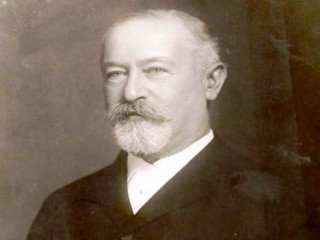
Jacob Schiff biography
Date of birth : 1847-01-10
Date of death : 1920-09-25
Birthplace : Frankfurt am Main, Germany
Nationality : German
Category : Famous Figures
Last modified : 2011-07-05
Credited as : Banker, philantropist,
Jacob Henry Schiff was born in Frankfurt am Main, Germany, on Jan. 10, 1847, of a middle-class family and a long line of rabbis and bankers. At the age of fourteen he was apprenticed to a business firm. In 1865 he emigrated to New York and soon set up his own brokerage office. In 1872 Schiff went to Germany to go into banking.
When Schiff returned to New York in 1875, he was invited to join the private banking firm of Kuhn, Loeb and Company. He soon became a leading member of the house and in 1885 its senior partner. Interested in railroad financing, Schiff found his big chance when he and E. H. Harriman (America's greatest railroad man) took over the Union Pacific Railroad in 1897.
Schiff and Harriman set out to acquire the Northern Pacific Railroad from J. P. Morgan and James J. Hill by stock-exchange maneuvers. The result was a financial panic in 1901. The titans settled on a holding company, the Northern Securities Company, which owned the stock of the Northern Pacific, the Great Northern, and the Burlington railroads, with the Schiff-Harriman interests fully recognized. Thanks to Schiff and J. P. Morgan, this was the golden age of American railroading; and Schiff was recognized as Morgan's peer.
Also between 1895 and 1910 Schiff's firm headed banking syndicates (using European money markets for funds and as outlets for the new securities) that formed several important American industrial mergers. From 1897 to 1906 Kuhn, Loeb and Company cooperated with other firms to market over $800 million in securities; during 1907-1912 it alone underwrote $530 million worth, and with other houses an additional $821 million. Schiff was imaginative enough to see that an American capital market had developed, and he floated dollar bonds to finance Mexican railroads and to raise money for Japan's war against Russia. Unlike Morgan, Schiff was not interested in voting trusts or in sitting on the boards of the companies he organized or reorganized, and he did not seek to become their depositories. His company did not control a group of banks or dominate credit agencies; to this extent, therefore, he did not earn the censure of the Pujo Committee's Money Trust Investigation of 1913.
As a devout Jew, Schiff became a spokesman for those Jews who believed in assimilation into American culture. He helped establish Jewish philanthropic agencies— hospitals, family-and child-care societies, recreation and settlement house centers—to help less fortunate coreligionists adjust to American life. Schiff also helped put the Jewish Theological Seminary on a sound footing, created the Semitic Museum at Harvard, and financed the departments of Semitic literature at the New York Public Library and the Library of Congress. He died in New York on Sept. 25, 1920.
















